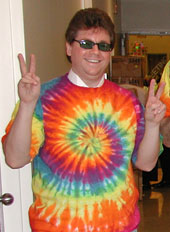User:Jeffq

My primary wiki work is on en:Wikiquote (where I am a sysop) and en:Wikipedia. Please see my user pages there for more information. You can post Wiktionary discussions on my talk page here. Even if I'm not active here, I'll get the message. I reply to issues here on appropriate Wiktionary talk pages, and to Wiktionary users on their talk pages (with a copy on mine for reference).
Lately, I've been spending most of my Wiktionary time on adding sourced, fully cited quotations (preferably as old as I can find) to existing entries. This parallels my sourcing work on both Wikiquote and Wikipedia.
Entries I've created
[edit]- CMA
- do the nasty
- ennealogy (ironically, mine is the 9th version)
- ginchy
- Google-fu
- has-been
- it's on
- Minnesota nice
- omphaloskeptic
- scientifiction
- YBP
Obviously, to paraphrase John Paul Jones, I've not yet begun to write. ☺
Neologisms to watch for
[edit]These are newly-coined terms I find intriguing, but whose reliable evidence for widespread use is inadequate (last time I checked).
- Google ghost: An entity (usually a person) with no presence online (primarily due to absence from any popular search engine, like Google Search).
- Moved to Citations:Google ghost.
- liliputer (perhaps more properly lilliputer): An inexpensive, ultraportable computer, typically using an embedded-system-class processor like the ARM.
- Derivation: Presumably a portmanteau of lilliputian and computer, "lilliputian" itself derived from the fictional race from Lilliput in Jonathan Swift's 1726 novel Gulliver's Travels.
- Apparently coined by Grant Robertson, Download Squad blog, and popularized by freelance journalist Brad Linder of Liliputing.com.
- Citations:
- Arthur, Charles; "The rise of the all-conquering Liliputer"; The Guardian, 28 August 2008.
- Hoover, Lisa; "Interview: Brad Linder Talks Linux and Ultraportable Computers"; OStatic.com; 3 September 2008.
- Derived forms: liliputing (lilliputing)
Oddities
[edit]- coulda shoulda woulda (or any of its other 5 permutations)
- An colloquial interjection expressing regrets over missed opportunities
- May or may not include commas, creating 12 textual variations
- Doesn't really belong in any of individual entries for coulda, shoulda, or woulda
- Doesn't seem to be a single preferred permutation
- Google Book Search shows 6,200 hits (as of 4 October 2010), including many works whose titles are different permutations, so it's well-established in the English language